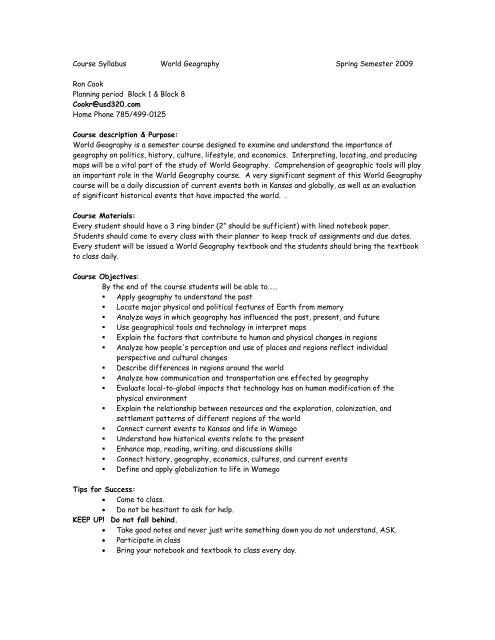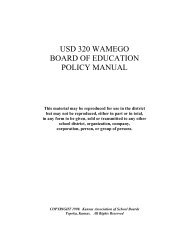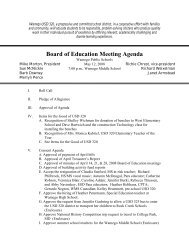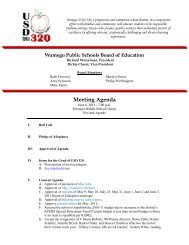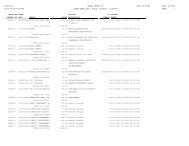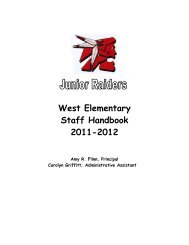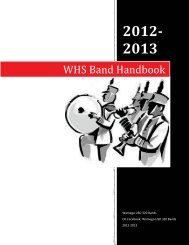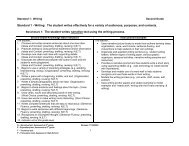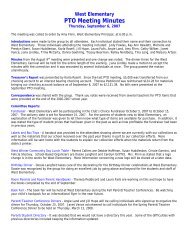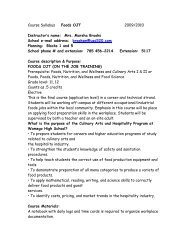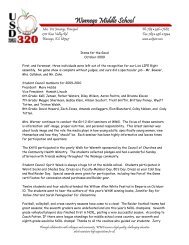Course Syllabus World Geography Spring Semester ... - USD 320
Course Syllabus World Geography Spring Semester ... - USD 320
Course Syllabus World Geography Spring Semester ... - USD 320
You also want an ePaper? Increase the reach of your titles
YUMPU automatically turns print PDFs into web optimized ePapers that Google loves.
<strong>Course</strong> <strong>Syllabus</strong> <strong>World</strong> <strong>Geography</strong> <strong>Spring</strong> <strong>Semester</strong> 2009<br />
Ron Cook<br />
Planning period Block 1 & Block 8<br />
Cookr@usd<strong>320</strong>.com<br />
Home Phone 785/499-0125<br />
<strong>Course</strong> description & Purpose:<br />
<strong>World</strong> <strong>Geography</strong> is a semester course designed to examine and understand the importance of<br />
geography on politics, history, culture, lifestyle, and economics. Interpreting, locating, and producing<br />
maps will be a vital part of the study of <strong>World</strong> <strong>Geography</strong>. Comprehension of geographic tools will play<br />
an important role in the <strong>World</strong> <strong>Geography</strong> course. A very significant segment of this <strong>World</strong> <strong>Geography</strong><br />
course will be a daily discussion of current events both in Kansas and globally, as well as an evaluation<br />
of significant historical events that have impacted the world. .<br />
<strong>Course</strong> Materials:<br />
Every student should have a 3 ring binder (2” should be sufficient) with lined notebook paper.<br />
Students should come to every class with their planner to keep track of assignments and due dates.<br />
Every student will be issued a <strong>World</strong> <strong>Geography</strong> textbook and the students should bring the textbook<br />
to class daily.<br />
<strong>Course</strong> Objectives:<br />
By the end of the course students will be able to……<br />
• Apply geography to understand the past<br />
• Locate major physical and political features of Earth from memory<br />
• Analyze ways in which geography has influenced the past, present, and future<br />
• Use geographical tools and technology in interpret maps<br />
• Explain the factors that contribute to human and physical changes in regions<br />
• Analyze how people's perception and use of places and regions reflect individual<br />
perspective and cultural changes<br />
• Describe differences in regions around the world<br />
• Analyze how communication and transportation are effected by geography<br />
• Evaluate local-to-global impacts that technology has on human modification of the<br />
physical environment<br />
• Explain the relationship between resources and the exploration, colonization, and<br />
settlement patterns of different regions of the world<br />
• Connect current events to Kansas and life in Wamego<br />
• Understand how historical events relate to the present<br />
• Enhance map, reading, writing, and discussions skills<br />
• Connect history, geography, economics, cultures, and current events<br />
• Define and apply globalization to life in Wamego<br />
Tips for Success:<br />
• Come to class.<br />
• Do not be hesitant to ask for help.<br />
KEEP UP! Do not fall behind.<br />
• Take good notes and never just write something down you do not understand, ASK.<br />
• Participate in class<br />
• Bring your notebook and textbook to class every day.
Grading:<br />
To demonstrate understanding of facts, concepts, and themes in <strong>World</strong> <strong>Geography</strong> the minimum<br />
acceptable grade on ALL SUMMATIVE ASSESSMENTS is 70%. Students' progress reports will<br />
initially display an "IP" (IN PROGRESS) for any assessment below 70%. This signifies the student is<br />
required to be reassessed on the information of that specific assessment within 5 school days.<br />
Students can be reassessed before school, after school, or during SIP time. The "IP" will not alter a<br />
student's overall class grade. However, after 5 school days, if the student has not taken steps to<br />
demonstrate understanding, the "IP" will change to "I," signifying the student's overall grade is now<br />
INCOMPLETE. The student will still be required to demonstrate learning above 70%; when this is<br />
accomplished, the grade will change to reflect the grade earned, 70-79%= C; 80-89%= B; and 90-<br />
100%=A.<br />
The goal of this grading system is 3 fold:<br />
1. Every student should have the appropriate understanding of every important concept in this<br />
class.<br />
2. Every student will take the opportunity to retake any assessment where an acceptable level<br />
of comprehension has not been demonstrated.<br />
3. Every student will realize the advantage of succeeding the first time (not having to see me<br />
before or after school or during SIP time).<br />
Classroom rules:<br />
Every student will be expected to follow the discipline guidelines established by the school<br />
and listed in the student handbook. We have one absolute rule:<br />
“No one will disrupt the learning of others in the classroom.”<br />
Expectations:<br />
In our classroom our expectations are as follows:*<br />
• There must be a supportive classroom environment<br />
• Students should do only useful work<br />
• Students are asked to do the best they can do<br />
• Students are asked to reflect on their own work and improve it<br />
• Quality work feels good<br />
• Quality work is never destructive<br />
*Dr. William Glasser's 6 conditions of Quality


